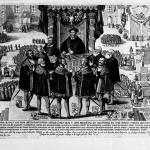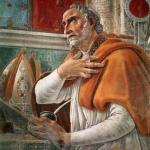Seth Kasten (see his blog) is a member of the Lutheran Church–Missouri Synod. This is one of a series of replies to his book, Against the Invocation of Saints: An Apology for the Protestant Doctrine of Prayer over and against the Doctrine of the Eastern Orthodox Church (Royal Oak, Michigan: Scholastic Lutherans, 2023). I will be using RSV for Bible passages unless otherwise noted. Words from his book will be in blue.
*****
See other installments:
The 16th century discussions between Tübingen and Constantinople lay a basic foundation for arguments on both sides. . . .
The Tübingen theologians respond[ed] by saying that the saints cannot hear us and that attributing such abilities to them is unscriptural on the grounds of Isaiah 63:16 and 2 Kings 2:9. . . . They appeal again to Isaiah 63:16 to demonstrate the inability of saints to hear us . . . (pp. 11-12)
These theologians, in my opinion, took Isaiah 63:16 out of context. It has little or nothing to do with the communion of saints or the question of whether they (including Abraham) could “hear” us or not.
Isaiah 63:16 For thou art our Father, though Abraham does not know us and Israel does not acknowledge us; thou, O LORD, art our Father, our Redeemer from of old is thy name.
Here are a few classic Protestant commentaries on this passage:
Ellicott’s Commentary for English Readers: The passage is striking as being an anticipation of the New Testament thought, that the Fatherhood of, God rests on something else than hereditary descent, and extends not to a single nation only, but to all mankind. Abraham might disclaim his degenerate descendants, but Jehovah would still recognise them.
Barnes’ Notes on the Bible: Abraham was the father of the nations – their pious and much venerated ancestor. His memory they cherished with the deepest affection, and him they venerated as the illustrious patriarch whose name all were accustomed to speak with reverence. The idea here is, that though even such a man – one so holy, and so much venerated and loved – should refuse to own them as his children, yet that God would not forget his paternal relation to them. A similar expression of his unwavering love occurs in Isaiah 49:15 : ‘Can a woman forget her sucking child?’ . . . The language here expresses the unwavering conviction of the pious, that God’s love for his people would never change; . . .
Jamieson-Fausset-Brown Bible Commentary: It had been the besetting temptation of the Jews to rest on the mere privilege of their descent from faithful Abraham and Jacob (Mt 3:9; Joh 8:39; 4:12); now at last they renounce this, to trust in God alone as their Father, notwithstanding all appearances to the contrary. Even though Abraham, our earthly father, on whom we have prided ourselves, disown us, Thou wilt not (Isa 49:15; Ps 27:10).
Geneva Study Bible: Though Abraham would refuse us to be his children, yet you will not refuse to be our father.
2 Kings 2:9 When they had crossed, Eli’jah said to Eli’sha, “Ask what I shall do for you, before I am taken from you.” And Eli’sha said, “I pray you, let me inherit a double share of your spirit.”
This is clever. The idea is that Elijah was implying that he couldn’t answer petitionary requests after his death. But I think it’s simply an example of the practice of blessings before death. Keil and Delitzsch Biblical Commentary on the Old Testament states for this passage:
The request of Elisha is evidently based upon Deuteronomy 21:17 [“giving him a double portion of all that he has”], where בּ פּי־שׁנים denotes the double portion which the first-born received in (of) the father’s inheritance, . . . Elisha, resting his foot upon this law, requested of Elijah as a first-born son the double portion of his spirit for his inheritance. Elisha looked upon himself as the first-born son of Elijah in relation to the other “sons of the prophets” [see 11 examples of this phrase in 1-2 Kings], inasmuch as Elijah by the command of God had called him to be his successor and to carry on his work. The answer of Elijah agrees with this: “Thou hast asked a hard thing,” he said, because the granting of this request was not in his power, but in the power of God. He therefore made its fulfilment dependent upon a condition, which did not rest with himself, but was under the control of God: “if thou shalt see me taken from thee . . ., let it be so to thee; but if not, it will not be so.”
In this understanding, Elijah was extending the customary Jewish blessing, right before death. It has no necessary relation to possible petitions after death. The blessing had to be made before Elijah went up to heaven (in effect, dying), according to Jewish custom.
They provide quotes against the cult of the saints from Epiphanius, Basil, and Chrysostom, . . . (p. 12)
I don’t know what these quotes are, but I have a few contrary ones of my own, from my book that I edited, The Quotable Eastern Church Fathers: Distinctively Catholic Elements in Their Theology (July 2013, 303 pages):
. . . not that we may omit supplicating the saints, . . .. (St. John Chrysostom, Homily V on Matthew 1:22-23, 8; NPNF1-10)
[I]t is possible to communicate after death even with the departed, with those who are asleep, who are already crowned, who want for nothing. (St. John Chrysostom, Homily III on 2 Timothy, v. 1:13-18; NPNF1-13)
I acknowledge also the holy apostles, prophets, and martyrs; and I invoke them to supplication to God, that through them, that is, through their mediation, the merciful God may be propitious to me, and that a ransom may be made and given me for my sins. Wherefore also I honour and kiss the features of their images, inasmuch as they have been handed down from the holy apostles, and are not forbidden, but are in all our churches. (St. Basil the Great, Letter #360; NPNF2-8)
Christians are bound to the scriptures and should seek the wisdom of the church fathers and should shape their practice accordingly, . . . and as I seek to demonstrate in this work, scripture and the church fathers do not allow for such a practice [invocation of saints] even in the highly qualified form. (p. 15)
We depart, however, from the EO [“Eastern Orthodox”: as throughout] on the practice of invocation of the saints– praying to the saints, or asking them for prayer. . . . The saints pray for us, we may pray for them, but it does not follow that we may pray to the saints. (p. 18)
And this is what I will attempt to refute in these replies, following the model already observed above: counter-exegesis and competing patristic quotations. All doctrines develop, but by and large, the Church fathers accepted the practice of invocation of the saints. If it is objected that this was a late development, I reply that the canon of Scripture was also a “late” development: coming, as it did, in the end of the fourth century. Other doctrines, such as sola Scriptura and sola fide (the two “pillars” of the Protestant Revolt) are, I would argue, absent altogether from Scripture and patristic consensus. But this doesn’t stop Protestants from believing both, and making them central in their rule of faith and soteriology.
Importantly, there is a theme that we are unworthy of coming to Christ and must instead turn to saints in prayer. (p. 22)
Seth then cites a prayer along these lines from St. Ephraim:
Through your pure and acceptable supplications, persuade the righteous Judge to have compassion on me…. Set my ragged life on a straight path that I might stand blamelessly before the Lord, having you as my mediator and helper. (p. 22)
Seth sums up: “The EO practice is not strictly asking saints for prayers but is also a reliance on saints as mediators or instruments of God’s grace, . . .” (p. 23)
This is an entirely scriptural prayer based on a thoroughly scriptural teaching (as I will now demonstrate). The Bible throughout calls for intercessory prayer, and teaches that the prayers of more righteous people are relatively far more powerful. So we go (or can and should go) to the especially righteous person, who in turn goes to God on our behalf. There is no reason why we can’t do this with departed saints (and I will defend that in depth later). It makes even more sense than asking for prayer from people on earth, seeing that they are perfected in heaven and in profound union with God (making their prayers all the more powerful). We ask saints in heaven to intercede, because their prayers to God have a far greater effect or efficacy than ours do. Where is this notion found in the Bible? It’s an undeniable teaching found in lots of places:
James 5:14-18 Is any among you sick? Let him call for the elders of the church, and let them pray over him, anointing him with oil in the name of the Lord; [15] and the prayer of faith will save the sick man, and the Lord will raise him up; and if he has committed sins, he will be forgiven. [16] Therefore confess your sins to one another, and pray for one another, that you may be healed. The prayer of a righteous man has great power in its effects. [17] Eli’jah was a man of like nature with ourselves and he prayed fervently that it might not rain, and for three years and six months it did not rain on the earth. [18] Then he prayed again and the heaven gave rain, and the earth brought forth its fruit.
Genesis 20:6-7, 17 Then God said to him [Abim’elech] in the dream, “Yes, I know that you have done this in the integrity of your heart, and it was I who kept you from sinning against me; therefore I did not let you touch her. [7] Now then restore the man’s wife; for he is a prophet, and he will pray for you, and you shall live. . . . [17] Then Abraham prayed to God; and God healed Abim’elech, and also healed his wife and female slaves so that they bore children.
This is notable in that God Himself is telling a person not to pray for himself, so that he “shall live”, but that a holier person (a “prophet”: Abraham) should do so, according to God’s own revealed will, in both special and written revelation (the Bible). Abraham was the holier person. He prayed, and good things happened as a result, because it was all according to God’s will. Abimelech was told by God Himself that Abraham would pray for him; therefore, he didn’t go “straight to God” in prayer.
1 Samuel 12:19, 23 And all the people said to Samuel, “Pray for your servants to the LORD your God, that we may not die; for we have added to all our sins this evil, to ask for ourselves a king.” . . . [23] “Moreover as for me, far be it from me [Samuel] that I should sin against the LORD by ceasing to pray for you; . . .
Numbers 11:1-2 And the people complained in the hearing of the LORD about their misfortunes; and when the LORD heard it, his anger was kindled, and the fire of the LORD burned among them, and consumed some outlying parts of the camp. [2] Then the people cried to Moses; and Moses prayed to the LORD, and the fire abated.
Numbers 14:13, 19-20 But Moses said to the LORD, . . . [19] “Pardon the iniquity of this people, I pray thee, according to the greatness of thy steadfast love, and according as thou hast forgiven this people, from Egypt even until now.” [20] Then the LORD said, “I have pardoned, according to your word; (cf. 21:7-9; Ex 32:30)
Why was Moses different? He was set apart; he was holy, he was the great deliverer, and had a direct, profound “face to face” relationship with God (Ex 33:11; Dt 34:10-11). Likewise, Moses’ brother Aaron atoned for his people and stopped a plague (Num 16:46-48). Phinehas likewise atoned and prevented God’s wrath from “consum[ing] the people of Israel” (Num 25:11-13). King Zedekiah asked Jeremiah the prophet to “Pray for us to the LORD our God” (Jer 37:3; cf. 42:20). Simon asked St. Peter to “Pray for me to the Lord, that nothing of what you have said may come upon me” (Acts 8:24). Peter later wrote in his own epistle: “the eyes of the Lord are upon the righteous, and his ears are open to their prayer” (1 Pet 3:12; cf. Ps 34:17; Jn 9:31; 1 Jn 3:22).
1 Kings 13:6 And the king said to the man of God, “Entreat now the favor of the LORD your God, and pray for me, that my hand may be restored to me.” And the man of God entreated the LORD; and the king’s hand was restored to him, and became as it was before.
Once again, a “man of God” (probably an unnamed prophet) had more powerful and efficacious prayers. King Jeroboam — though a wicked king like all of the kings of northern Israel — still nevertheless recognized this true principle.
Job 42:8-9 “. . . my servant Job shall pray for you, for I will accept his prayer . . ..” [9] . . . and the LORD accepted Job’s prayer.
Job’s prayers had more power because he was described in the book bearing his name (in God’s eyes) as “blameless” (1:1, 8; 2:3). God specifically stated that “I will accept his prayer.” He didn’t say: “pray straight to Me so I can be merciful.”
The biblical data in this regard can thus be summarized as follows:
It’s best to “go straight to God” in prayer, unless there happens to be a person more righteous than we are, who is willing to make the same prayer request. In that case, the Bible recommends that we ask them to intercede for us or any righteous cause, rather than asking God directly, precisely because their prayers have “great power” in their “effects” (Jas 5:16). By extension, this procedure includes asking dead saints, perfected in God, to pray for us.
*
***
*
Practical Matters: Perhaps some of my 4,500+ free online articles (the most comprehensive “one-stop” Catholic apologetics site) or fifty-five books have helped you (by God’s grace) to decide to become Catholic or to return to the Church, or better understand some doctrines and why we believe them.
Or you may believe my work is worthy to support for the purpose of apologetics and evangelism in general. If so, please seriously consider a much-needed financial contribution. I’m always in need of more funds: especially monthly support. “The laborer is worthy of his wages” (1 Tim 5:18, NKJV). 1 December 2021 was my 20th anniversary as a full-time Catholic apologist, and February 2022 marked the 25th anniversary of my blog.
PayPal donations are the easiest: just send to my email address: [email protected]. Here’s also a second page to get to PayPal. You’ll see the term “Catholic Used Book Service”, which is my old side-business. To learn about the different methods of contributing (including Zelle), see my page: About Catholic Apologist Dave Armstrong / Donation Information. Thanks a million from the bottom of my heart!
*
***
Photo credit: geralt (4-19-18) [Pixabay / Pixabay Content License]
Summary: One of my series of replies to Lutheran Seth Kasten on the invocation of saints. I address his objections and biblical and patristic arguments against the practice.














